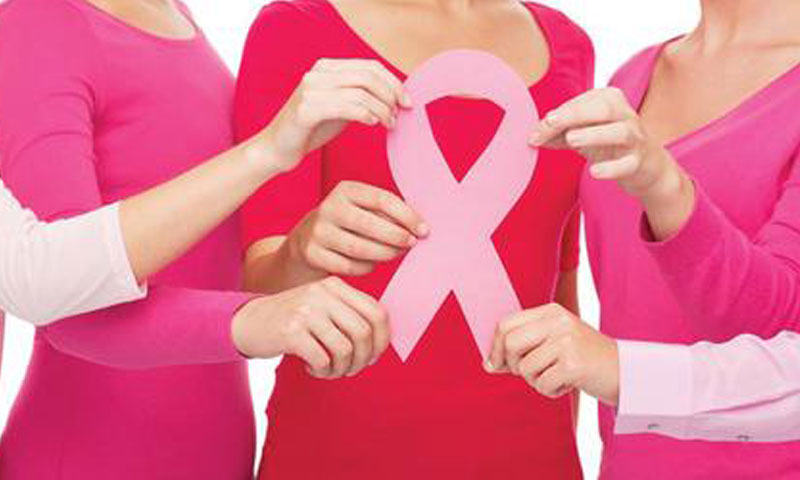
Syrian Breast Cancer Patients Suffer Doubly under War

SYRIA —Breast cancer patients undergo a double suffering due to war. Their challenges keep increasing, including rare medicines, treatments’ high costs and the difficulty of reaching hospitals providing them. The Breast cancer dilemma gets more complicated in the besieged regions.
Cancer Drugs Missing from Al-Ghouta
Samira is a Syrian woman with breast cancer, whose condition improved by follow-up and treatment. Tragically enough, her health deteriorated so fast, and she ended up dying after cancer medications had been cut off from Eastern Ghouta because of the intensified siege imposed on the region.
Samira represents the condition of many cancer patients in the current situation, according to Dr. Wissam al-Riz, the Director of Dar Al-Rahma Center for Cancer (The Home of Mercy for Cancer), the only center specialized in tumours’ treatment in the entire of Eastern Ghouta.
To Enab Baladi, Dr. Wissam said “We can’t do much for them. With medicines being cut off and the Syrian regime preventing the supplies, the deaths increased day after day, and all we could do was watching.”
Talking about the number of cancer cases in the Eastern Ghouta, she said that 669 women are suffering from the disease: About 300 have breast cancer, of which 110 were fully cured, while eight died in the past two months.
Dr. Wissam said that the center, sponsored by certain organizations, provides cancer patients with medicines and cost-free treatment.
The towns in Eastern Ghouta are under a stifling siege, which became harder with the military campaign launched by Assad’s forces in the areas of Barzeh and Qaboun, in the south of Damascus, in March— These military operations aggravated the suffering of people with chronic diseases.
War’s Impact on Breast Cancer Rates
About war’s role in increasing cancer rates and the deterioration of the cases having it, Dr. Wissam mentions two factors:
The first factor is psychological, resulting from the patients being affected by the intensive shelling, the lacking sense of security and pain and grief over the beloved people they are losing.
The second factor has to do with the siege: The Syrian regime’s preventing the supplies, including food and medicine, from reaching Eastern Ghouta has led to the suspension of using certain medicines due to some patient’s physical weakness and their inability to tolerate high doses. Most of the time, cancer is the one to win control over weakened bodies.
“This is how the situation went on in the past time when we suffered a shortage of medicines. The situation now is more fatal; medicines are no more available and there is no way to get them because of the total siege forced by the Syrian regime in the region,” Dr. Wissam said.
According to the doctor, there are many cases which have relapsed as a result of the siege; she tells us the story of Aisha, a woman with breast cancer, who conducted tests in Al-Rahama Center last August. Back then, the doctors assured that she recovered almost completely. Only a month later, she relapsed and entered a phase of fast collapse to die at the end of September.
As for the importance of cancer’s early detection, the doctor said, many seminars have been conducted to raise awareness about cancer in Ghouta, but they weren’t enough and didn’t reach most of the people. She stressed the importance of launching regular cancer awareness campaigns.
No Chemotherapy Centers in Idlib
As for breast cancer in Idlib governorate, in northwestern Syria, Dr. Anas Daghim, the primary health care officer at the Idlib Health Directorate, told us that there was an increase in cancer rates due to the increase in carcinogens, especially the chemical substances used during the Syrian regime’s attacks on Idlib and rural Hama, a city in west-central Syria.
The lack of medicines, chemotherapy and radiotherapy centers, in addition to the difficulty of entering Turkey or the areas under the Syrian regime, due to the security situation and the fear of arrest, are leading to an increase in the numbers of patients having cancer and aggravating the cases which already have it.
He said that the treatment of breast cancer has two phases: A surgical phase and a medicinal one. He also indicated that surgical treatment is available in most of the region’s hospitals, stressing its efficiency.
However, chemotherapy and radiotherapy are not available. There is not a single specialized center in Idlib, and breast cancer medications are obtained from either Turkey or the areas under the Syrian regime.
Having Breast Cancer at an Early Age
Concerning the effects of war and immigration on cancer patients, Dr. Wissam Al-Dalati, the Director of the Breast Diseases Department at MABs, based in Lebanon, told Enab Baladi that, most of the cases which the center diagnoses are late comers, which makes their response to the treatment a poor one.
He explained that 80 percent of the women who come to the center for treatment are in the third or the fourth stage of the disease. He also pointed to the fact that, in the fourth stage, the tumour would have spread throughout the body and there is not a chance for treatment. In the third stage, there is a possibility of recovery, but with the need for all types of treatment, including surgery, chemotherapy, and others, which cost a lot and result only in a low level of recovery.
The organization’s center, in Lebanon, has started working about a year and a half ago. During this time, he said, about 4000 women had been scanned, out of which 55 cancer cases have been diagnosed at a rate of three cases per month.
He pointed out that cancer’s rates are close to the international ones, known in countries with high levels of breast cancer. He also said that the disease is happening at an early age, 45 percent of the cancer cases are under the age of 50 while globally only 20 percent of women have cancer under the same age.
Breast Cancer’s Symptoms
Dr. Wissam al-Dalati identifies the disease’s symptoms as follows:
A sensation of having lump in the breast (a basic symptom).
Feelings of pain in the breast.
Ulceration and hemorrhage in the nipple.
Having a knot under the armpit.
The doctor stressed the importance of conducting a periodic scan for each woman over the age of forty every year or two depending on the availability of risk factors, which he summarized as:
Genetics (the main factor).
Early menstrual cycle.
Delayed menopause.
Hormonal therapy after menopause.
Obesity.
Smoking.
Alcohol abuse.
Breast Cancer Prevention
The doctor summarized the disease’s preventive factors as follows:
Breastfeeding.
Having children at an early age.
Sports.
Weight Loss.
Keeping away from smoking and alcohol.
He also stressed the importance of cancer’s early detection, breast self-examination, and visiting doctors upon having certain complaints. The early detection of a first stage tumour and having an effective treatment lead to a 100 percent recovery.
In a second stage tumour, recovery goes down to 90 percent.
In a third stage, recovery staggers between 50 to 70 percent.
October, Breast Cancer Awareness Month
The month of October was devoted to breast cancer awareness in all countries of the world, an initiative to increase attention to the disease and ways to prevent it at the international level.
An estimated 1.38 million new cases of breast cancer occur annually and 458,000 deaths, according to WHO.
Global statistics show that the number of deaths due to cancer in developing countries is increasing significantly because of war, lack of treatment and early detection. Contrastingly, developed countries are witnessing a decline in deaths due to early detection procedures and advanced treatment options.
Doctors predict a future increase in the number of cancer patients in Syria due to the long-term impact of war waste, such as chemical, organic and mineral contamination.
if you think the article contain wrong information or you have additional details Send Correction
النسخة العربية من المقال
-
Follow us :
Most viewed
- Reduction of Fifth Corps: Pressure on Moscow reflected in Syria
- Saudi Arabia to prosecute sheikh Saleh al-Shami and ten Syrians in May
- Hidden aspects of Iranian consulate building targeted in Damascus
- AANES receives first batch of Syrian refugees deported from Iraq
- US House of Representatives passes "Captagon II" bill

















 A
A
A
A
A
A



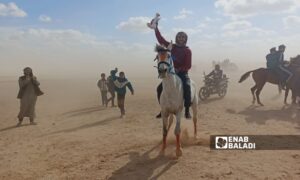
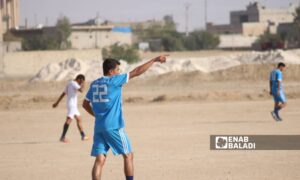
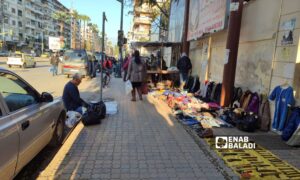
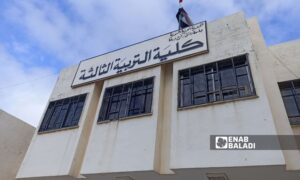

 More Society
More Society